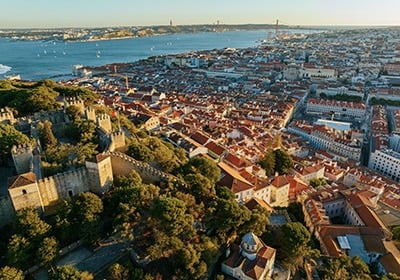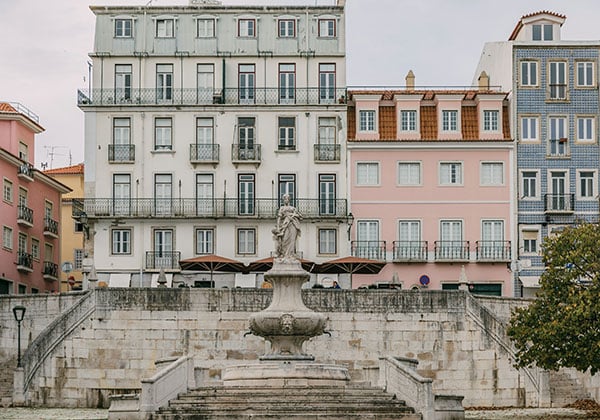Updated: January 27, 2026
 The cost of living in Lisbon is relatively affordable, mainly if you compare it to the United States and some Western European countries, like the United Kingdom, Germany, and France, where rent, property prices, and daily expenses are often more expensive.
The cost of living in Lisbon is relatively affordable, mainly if you compare it to the United States and some Western European countries, like the United Kingdom, Germany, and France, where rent, property prices, and daily expenses are often more expensive.
Whether you plan on moving to Lisbon permanently or temporarily, you should consider the different prices for healthcare, groceries, local transportation, and other expenses. That’s exactly where the guide below can help.
Recently, Lisbon’s living costs went up due to the booming startups, tech hubs, and growing interest from international investors.
But, even if property prices are on the rise, the Portuguese capital remains a top choice for many expats, retirees, and digital nomads.
Quick Summary
- Even if Lisbon is the most expensive city in Portugal, it is still cheaper to live there than in the United States and major cities in Western Europe.
- The capital is a world-class beauty spot for its coastal lifestyle, quite similar to San Francisco. But you are going to spend less in Lisbon on medical insurance, rent, tuition fees, and restaurant visits.
- Your lifestyle choices and minimum wage will affect your overall expenses, yet you can expect a good standard of living, with a high quality of life in a country that can make you feel safe.
- Single person monthly cost is around €1,300 to €1,600 (excluding rent).
- When comparing Lisbon vs Porto, the capital city is 17 percent to 20 percent more expensive overall.
- A comfortable lifestyle for a couple in Lisbon would cost around €2,500 to €3,200 per month (including rent).
Average Monthly Living Costs in Lisbon
 Lisbon is the capital of Portugal, so it comes with high prices. Regardless, the city provides excellent value for money. For example, primary education is free for residents and Portuguese citizens at public schools. The country also has an excellent public healthcare system that is affordable and reliable.
Lisbon is the capital of Portugal, so it comes with high prices. Regardless, the city provides excellent value for money. For example, primary education is free for residents and Portuguese citizens at public schools. The country also has an excellent public healthcare system that is affordable and reliable.
Overall, the cost of living in Portugal is reasonable. Most living costs in Lisbon, from securing an apartment to eating in your local restaurant, are significantly cheaper than in other EU countries.
But your expenses will vary based on your income, financial situation, and spending habits. For example, have you considered luxuries, travel, and nightlife? You will need a higher budget if you prefer to eat out most nights and party regularly.
In fact, in the Numbeo Cost of Living Index, Lisbon takes the 103rd spot, based on property prices, rent, groceries, and other expenses. This makes it a cheaper place to live than in London (United Kingdom), Amsterdam (Netherlands), San Francisco (US), and Stockholm (Sweden).
Here you can see some average prices for common goods in Lisbon:
Item | Price |
Milk (1 liter) | €0.99 |
Loaf of fresh white bread (500g) | €1.59 |
12 eggs | €3.04 |
Local cheese (1kg) | €11.32 |
Chicken fillets (1kg) | €6.98 |
Oranges (1kg) | €1.69 |
Domestic beer (0.5 liter bottle) | €1.11 |
Bottle of wine (mid-range) | €5.00 |
Is Lisbon Expensive?
Lisbon can be relatively expensive compared to other cities in Portugal, but it is still more affordable than many major capitals in Western Europe, such as Bern, Amsterdam, London, Paris, and Copenhagen.
Housing costs vary based on the neighborhood and apartment size, with the average cost of an apartment in the city center being €6,173 per square meter. Monthly budgets for groceries range from €250 to €300, utilities cost around €125, and transportation expenses are approximately €40 per month. Rent is a key factor in monthly expenses, with a one-bedroom apartment in Lisbon costing between €1,043 and €1,410.
In general, living costs in exclusive neighborhoods like Santa Maria Maior, Santo António, and Misericórdia are higher than in other areas of the country. However, prices tend to be significantly lower in neighborhoods further from the city center, such as Marvila, Olivais, Carnide, and Lumiar. A Marvila real estate investment could be a smart move at the moment, as the neighborhood is positioning itself as one of the new prime hubs in the capital.
The total gross monthly salary in Portugal is €1,777, according to Statistics Portugal. The average worker in Lisbon takes home about €1,595 a month after taxes. Therefore, to manage living expenses comfortably, you will need a monthly budget of approximately €1,500 to €3,000.
Housing: Rent & Utilities in Lisbon
There are many beautiful neighborhoods in Lisbon, each with its own unique characteristics. Whether you want to live in the city center or the surrounding area, you will find stunning properties to rent or buy. Read our article to find out more about homes for rent in Lisbon, Portugal.
 Renting property
Renting property
Based on recent data, the average rent price per month in Lisbon is:
- 1-bedroom in city centre: €1,100–€1,800
- 1-bedroom outside centre: €800–€1,300
- 3-bedroom in centre: €2,000–€3,500
- 3-bedroom outside centre: €1,400–€2,300
- Room in shared housing: €350–€550
The best neighborhoods in Lisbon for you to invest in will depend on your personal preferences, lifestyle, and property goals.
 Buying a property
Buying a property
 Foreigners can buy property in Lisbon without any restrictions. Lisbon real estate market prices have been increasing over the past years, and housing costs must be taken into account. The average Lisbon housing price stood at €6,934 per square meter in 2024. If you look at Greater Lisbon, this is reduced to €4,935 per square meter.
Foreigners can buy property in Lisbon without any restrictions. Lisbon real estate market prices have been increasing over the past years, and housing costs must be taken into account. The average Lisbon housing price stood at €6,934 per square meter in 2024. If you look at Greater Lisbon, this is reduced to €4,935 per square meter.
Lisbon real estate is now a top choice among foreign buyers. The purchase price can be higher or lower than the asking price—although it is usually lower—so keep this in mind when negotiating with the seller.
You can buy an apartment for €6,173 per square meter in the city center, or for €4,030 per square meter further away from the center. However, these prices are subject to change and are a general estimate, which vary based on the type of property, location, and demand. Lisbon is a profitable Portuguese city, offering high returns, being the sixth best city in Europe for buy-to-let.
Lisbon land for sale is also much more affordable than buying a property close to the capital, and you’ll be able to customize the land to your heart’s content.
Close to Lisbon, the seaside town of Cascais could also be an excellent choice, particularly amongst families and lifestyle buyers. The cost of living in Cascais is on par with Lisbon, with rent prices being lower in Lisbon, while groceries and restaurants tend to be higher.
To purchase property anywhere in Portugal, you must obtain a Portuguese Tax Number (NIF). It is highly recommended that you open a Portuguese bank account to avoid transaction fees. There are many banks in Portugal, and you can even open one online.
You can consult with a real estate agent in Lisbon to keep up with recent updates on the property market.
 Utility costs
Utility costs
The cost of electricity, gas, and water will depend on the size of the property and the number of people living there. For example, a 45m² studio or a small apartment can cost between €80 and €90 per month. The monthly fee is also dependent on your provider.
For an 85m² apartment, expect to pay over €125 per month for utilities like electricity, water, and gas. However, for some apartments, there will be no additional cost, as these will be included in the rental price. Be sure to check if your bills are included in the rental price.
For mobile phones, a monthly plan with calls and 10GB+ data will cost around €20.
Everyday Expenses in Lisbon
Healthcare
 Portugal has relatively cheap and very good quality healthcare. This is provided by the public National Health Service (Serviço Nacional de Saúde or SNS).
Portugal has relatively cheap and very good quality healthcare. This is provided by the public National Health Service (Serviço Nacional de Saúde or SNS).
Most essential medical services are almost free. You will be required to pay additional fees for non-essential services and treatments, which will vary in price. For example, a consultation will cost less than Accident & Emergency, and X-rays will require you to pay an additional fee.
There is also private healthcare, which has become more popular. Private healthcare costs will depend on the consultation and treatment.
Dental treatment does not usually fall under the National Health Service for most residents. You will probably have to pay out of your own pocket unless you have private dental insurance. Elderly people and children may receive free treatment.
Dental treatment is not as expensive as in other countries. Dental filling in the USA can cost €185 to well over €465, €190 to €270 in the UK, and €50 to €75 in Portugal.
Our guide for healthcare in Portugal takes a closer look at the potential expenses for various services.
Childcare and schooling
Public schools are free in Portugal, but remember that the lessons will be taught in Portuguese. If your children are young, they will pick up the language quickly.
There are many very good quality English-speaking international schools available in Lisbon. Expect to pay around €800 to €1,800 per month for international primary schools. Our guide to international schools in Lisbon provides more information.
Restaurants
 When it comes to restaurants in Lisbon, there are plenty of affordable options, and a typical meal at a mid-range restaurant will cost around €15 to €20 per person.
When it comes to restaurants in Lisbon, there are plenty of affordable options, and a typical meal at a mid-range restaurant will cost around €15 to €20 per person.
You’ll find many restaurants in Lisbon, from extremely affordable eateries to mid-range and luxury Michelin-starred restaurants. You’ll be pleased to see many a tasca (traditional, local, inexpensive restaurant) where you can happily eat great food for between €8 and €15, often with a café and sobremesa (dessert) included.
This is often typical traditional fare that is very well-cooked in family-run restaurants. Domestic beer costs about €1.11 for a 0.5-liter bottle, while a mid-range bottle of wine can cost €5.00.
For something a bit more special, a three-course meal for two in a mid-range restaurant will cost around €55, and for luxury restaurants, you can expect to pay international prices.
Household essentials
Generally speaking, household essentials, like food or cleaning products, are fairly affordable.
What’s more, Portugal’s produce is incredible. Much of it is grown in the green hills of the Alentejo region, where the constant sunshine makes for delicious fruits and vegetables. Also, because of the long coastline, it will be no surprise that the fish and seafood available are both cheap and extremely good.
Going grocery shopping is generally very affordable. A weekly grocery budget for one person can be around €60 to €80 for a frugal lifestyle. In most cases, you may need a monthly budget of €250, €300, to €400, depending on what products you buy, where you shop, and if you buy in bulk. Meat, fish, fruits, and vegetables are all inexpensive and of very good quality.
Olive oil costs roughly €12 to €28, depending on the brand. The fresh produce is also excellent. Oranges from the Algarve, cheese from the Azores, fish straight from the Atlantic, and wine from countless regions in the country are among the freshest products available at local markets.
Transportation costs
 In Portugal, public transport is relatively cheap and well-connected. You can travel from Lisbon to Porto for as little as €28 to over €80. The monthly public transport pass for the Lisbon Metropolitan Area (Navegante Metropolitano) is €40.
In Portugal, public transport is relatively cheap and well-connected. You can travel from Lisbon to Porto for as little as €28 to over €80. The monthly public transport pass for the Lisbon Metropolitan Area (Navegante Metropolitano) is €40.
A monthly pass for €30 allows you to travel around just one municipality. Young people can also get discounts, and children under 13 can travel for free. A monthly pass for families, which costs €80, is also available for the Lisbon Metropolitan area.
An individual trip will cost you about €1.61 (with ‘Zapping’) or €1.85 (a single Metro ticket). With “zapping,” you can quickly and easily top up your Viva Viagem card to get around the city. Gasoline is around €1.77 per liter in Lisbon, but it often fluctuates.
Sports and leisure
There are plenty of things to do in Lisbon for fun. You can expect to spend about €8.00 for a seat at the cinema for an international release movie. If you play tennis and want to rent a court for an hour on the weekend, it can cost you €16.87.
A monthly fee for a fitness club is about €43.89. However, the expenses vary based on the type of services, location, and entertainment venue. Many Lisbon tourist attractions are reasonably priced compared to other European capitals.
Shopping
You will find chain stores and local Portuguese boutique shops in the capital. When spending money on clothes and brand-name products, you will notice that prices generally meet international standards.
Lisbon has many shopping malls and shops where you can get your shopping fix. You should have no problem finding everything you would find in your local store, including clothes and shoes. For more information on life in the capital, check out our article: Living in Lisbon: A Guide for foreigners.
Cost of Living in Lisbon for Retirees
 The capital has become a firm favorite among seniors looking for a high quality of life.
The capital has become a firm favorite among seniors looking for a high quality of life.
If you are thinking about retiring in Lisbon, the cost of living for retirees will also not set you back much, and you should be able to live a very high quality of life in the city.
Generally, Portugal is an affordable country to live in. Healthcare is also excellent and affordable, particularly compared to healthcare in the USA or other Western European countries.
If you want to learn more about the lifestyle for seniors, check out our guide on retirement homes in Lisbon, Portugal.
Cost of Living in Lisbon Compare to Other region in Portugal
Lisbon is Portugal’s economic and cultural center, and that positioning comes with higher day-to-day costs. Housing is the main driver, but the differences extend into dining, transport, and general lifestyle expenses. What remains consistent across the country is that Portugal still offers comparatively good value by Western European standards — but the regional variations are significant.
Lisbon vs Porto
Porto is Portugal’s second-most expensive city, although still substantially cheaper than Lisbon. Housing costs can be 25 to 40 percent lower, and day-to-day expenses follow suit. A single person typically spends €600 to €850 per month before rent, with total costs around €1,300 to €1,800 with accommodation included.
Lisbon vs Algarve
The Algarve presents a dual reality. Local towns such as Portimão, Tavira, or Loulé have moderate living costs similar to mid-sized Portuguese cities. Yet high-end areas — Quinta do Lago, Vale do Lobo, Vilamoura — can rival Lisbon pricing, particularly in housing and dining.
Lisbon vs Coimbra or Braga
University and mid-sized cities like Coimbra, Braga, Aveiro, and Évora offer some of the best value in Portugal. Daily expenses are lower, and rents can be half or even a third of Lisbon’s. A single resident often spends €500 to €700 per month on essentials, or €900 to €1,300 including rent.
What is the cost of living in Lisbon compared to the US?
Lisbon is much cheaper than the United States, especially in cities like Washington, DC.
Here is why:
- The cost of living in Lisbon (excluding rent) is around 37.7 percent lower than in Washington, DC.
- Rent in Lisbon is 45.5 percent lower than in Washington, DC.
- Restaurant prices are 44.5 percent lower in Lisbon than in Washington, DC.
- The cost of groceries in Lisbon, Portugal, is 45.4 percent lower than in Washington, DC.
This is one of the many reasons that Portugal sees an increasing number of American expats and investors heading to its sunny shores. With talk that Lisbon is the new LA, Americans are taking note and looking for a better quality of life, with cheaper healthcare, progressive legislation, pristine beaches, and a wonderful climate.
But not just Americans are moving to Portugal; foreigners are also coming from Europe, China, South America, and Brazil.
Goldcrest is a buyer’s agent that is based in Lisbon. We provide expert, impartial advice on real estate investments and how to buy property in Portugal. From scouting out the perfect property through to property acquisition, we have you covered throughout the process. If you are looking to purchase property in Portugal, don’t hesitate to get in touch. Our team of skilled experts is available to solve all your real estate doubts, helping you with the property search and offering insightful expertise and strategic advice.Goldcrest: How We Can Help You
Why choose Goldcrest?
Frequently Asked Questions about the Cost of Living in Lisbon
How much does it cost to live in Lisbon?
The estimated monthly expenses for a single person in Lisbon, excluding rent, are around €750. The estimated cost for a family of four is over €2,600, not including rent. The cost of living will depend on your lifestyle habits and whether you enjoy a life of luxury. Unlike many other European capital cities, Lisbon is quite affordable.
Is Portugal an expensive country to live in?
From Lisbon real estate to groceries, the capital is a relatively cheap country to live in when compared to other countries in Europe.
What is the cost of living in Lisbon compared to in the US?
Lisbon has a low cost of living and is much cheaper than US cities. For example, rent prices in Lisbon are 45.5 percent cheaper than in Washington DC, restaurant prices are 44.5 percent cheaper, and the cost of living is 37.7 percent lower, not including rent.
How much money do you need to live comfortably in Lisbon?
A family of four can live a comfortable lifestyle in Lisbon for approximately €2,600, without rent. A single person’s estimated monthly cost is €750 without rent. The cost of living in Lisbon for a couple will be something in between. Note that the cost of living in Lisbon per month will vary depending on your lifestyle.
What is the average rent in Lisbon?
Rent prices in Lisbon vary based on the location and size of the apartment. A one-bedroom place in the city center costs around €1,410 a month, while the same outside the center is closer to €1,043. For more space, a three-bedroom apartment in the center can go for about €2,557 a month, or €1,697 if you want to live farther out.
Can I live in Portugal for €1,000 a month?
Living on €1,000 a month is possible but very difficult in major cities like Lisbon or Porto, where rent alone can exceed that budget. However, you can live in Portugal on a €1,000 salary in smaller, rural towns, where rent is much lower. You would have to be very frugal and cook most of your meals at home.
Can I work remotely in Portugal?
Yes, the Digital Nomad Visa, launched in 2022, has made it easier for remote workers to relocate to Portugal. The average salary in Lisbon is quite low, so many expats work remotely, freelance, for an online business.
Is Lisbon affordable?
Lisbon is an affordable city, especially if you compare it to other capitals in Western Europe, like London and Paris, or the United States. Lisbon consumer prices are 43.2 percent cheaper than in London, and significantly more affordable than in New York.
What is the cost of living in Lisbon for international students?
The cost of living for international students in Lisbon is different for everyone. A frugal student can get by with about €800 per month, primarily by sharing a room in a flat or a university residence. You should be able to find a room for around €350 to €500 for a shared apartment. More expensive options, like private studios, can push monthly costs to over €1,200.
What is the cost of living in Lisbon for a family?
According to Numbeo, a family of four’s estimated monthly costs are over €2,600, not including rent. Monthly costs will no doubt depend on your lifestyle and spending habits. However, you will find living expenses, for most things, more affordable than in most other countries in Western Europe.
How many people live in Lisbon?
As of 2025, more than three million people live in Lisbon. Lisbon’s population has gone up by about 13,660 people in the past year, which is a small but steady growth of about 0.45 percent.
Is Lisbon a good place to live?
Lisbon is renowned for its welcoming atmosphere, rich cultural diversity, and vibrant arts scene, making it an attractive place to reside. The sublime weather and gastronomy add to its appeal, as does its excellent healthcare and education systems – there are 30 international schools in the Greater Lisbon Area.
How does the cost of living in Lisbon compare to living in major cities in other countries in Western Europe?
Lisbon’s cost of living is lower than that of many cities in Western Europe, offering a more affordable lifestyle compared to many major Western European cities. The cost of living in Lisbon is 24.0 percent more affordable than Paris and 40.8 percent lower than London, including rent.
Can you live off your US social security in Lisbon?
Yes, many Americans do manage to live in Lisbon on U.S. Social Security alone, but it depends heavily on your monthly benefit, your housing choices, and whether you want a “comfortable” or “bare‑bones” lifestyle. For most retirees, Lisbon is more affordable than major U.S. cities, yet central rents and health insurance can quickly stretch a modest Social Security check.